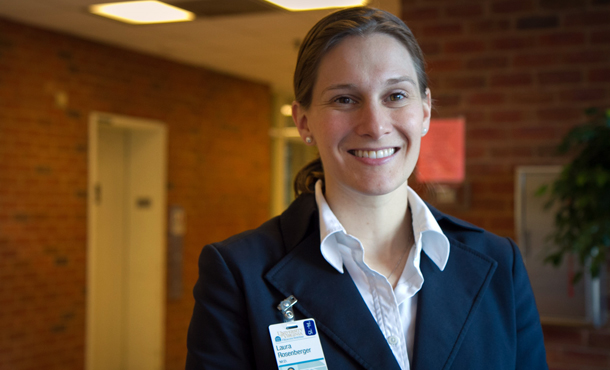Faith is not a common topic of discussion at the weekly University of Virginia Medical Center Surgery Grand Rounds. And yet faith is what Eastern Mennonite University alumna and current UVa chief resident in surgery Laura Horst Rosenberger ’03 chose to talk about in her Jan. 28 presentation titled “Mennonites in Medicine: Missionaries to Dean of Harvard.”
The Grand Rounds lecture traditionally offers medical professionals the opportunity to learn from colleagues about topics that may be outside of their direct specialty. By convention, topics have a scientific, rather than cultural, basis. Previous surgery Grand Rounds at UVa in 2014 included lectures on breast cancer treatments, donor lungs, clinical trials, and critical care.
But learning about this particular faith and culture is particularly pertinent for area doctors, Rosenberger said, because of the large Mennonite population in the region. In her hour-long talk in a lecture hall packed with more than 150 attendees, Rosenberger hoped to help colleagues “understand the plethora of patients you are treating and some of the staff you work with.”
Rosenberger began with an explanation of the Anabaptist faith and the difference between the Mennonites and Amish. She then highlighted pacifism, a core belief of Anabaptism, and how this belief has shaped Mennonite contributions to the medical field.
During World War II, for example, many Mennonite conscientious objectors were assigned to the Civilian Public Service, an alternative form of public service administered by agencies linked to the “peace church” tradition: Mennonite Central Committee (MCC), Brethren Service Committee and American Friends Service Committee. At camps around the country, CPS draftees worked in natural resources and agriculture, but they made arguably their most important contribution in mental health, Rosenberger said. (For an EMU story about Mennonites who worked in mental hospitals under CPS, click here.)
“There was a large movement to improve the conditions of mental health facilities for patients during this time, which can be traced to Mennonites and Quakers who had served in so many of these facilities,” she said.
Rosenberger also highlighted four examples of Mennonites and their impact on healthcare across the globe. Mennonites have founded hospitals, contributed to the successful treatment of African Burkitt lymphoma (Glen R. Brubaker ’62, MD) and Hansen’s disease (leprosy), and conducted key research that led to finding the location of the gene for Huntington’s disease. This last example was the work of prominent physician and neuroscientist Joseph Boyd Martin ’59 who, among other distinguished positions, served as dean of Harvard Medical School from 1997 to 2007. (Rosenberger did not mention this alum by name, but Richard Keeler ’60, MD, was given EMU’s annual “distinguished service award” in 2004 for his 13-year commitment to the eradication of Hansen’s disease in Trinidad and Tobago.)
In summary, Rosenberger read a modified version of the EMU mission statement that included, “Bear witness to faith, serve with compassion, and walk boldly in the way of nonviolence and peace.”
After graduation from EMU, Rosenberger completed her medical degree at Jefferson Medical College in Philadelphia, Pennsylvania. She has been a surgical resident at UVa since 2008, completing a master’s degree in clinical research in 2011 and being named chief resident in surgery in 2014. Next year she will complete a surgical fellowship in breast oncology at Memorial Sloan Kettering Cancer Center in New York City.
Background note from the editor: Laura Rosenberger remains one of EMU’s top student-athletes ever. She won all six ODAC pole vault titles possible (indoor and outdoor) and was the national champion four times before her senior year. She stopped athletic competition her senior year to focus on academics in preparation for medical school. EMU inducted Rosenberger into the Athletics Hall of Honor in the fall of 2013.
